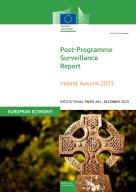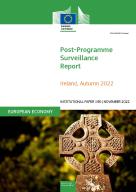Post-programme surveillance
From 2011 until the end of 2013 the European Union and the International Monetary Fund (IMF) provided financial assistance to Ireland. In December 2013, Ireland successfully completed the EU-IMF financial assistance programme, with the vast majority of policy conditions under the programme substantially met and investor confidence restored for the sovereign and the banks.
Ireland is subject to post-programme surveillance (PPS) until at least 75% of the financial assistance received has been repaid. PPS will last at least until 2031.The objective of PPS is ultimately to measure Ireland's capacity to repay its outstanding loans to the European financial stability mechanism (EFSM), European financial stability facility (EFSF) and bilateral lenders.
Under PPS, the European Commission and the European Central Bank (ECB) will
- conduct regular review missions in Ireland to assess its economic, fiscal and financial situation
- prepare semi-annual assessments of Ireland's economic, fiscal and financial situation and determine whether corrective measures are needed
Overview of disbursements
Overview of EFSM loan disbursements to Ireland
|
Amount |
Maturity |
Raised on |
Disbursed on |
|
€0.8 billion |
10 yr |
18 March 2014 |
25 March 2014 |
|
€1 billion |
15 yr |
23 Oct. 2012 |
30 Oct. 2012 |
|
€2.3 billion |
15 yr |
26 June 2012 |
03 July 2012 |
|
€3 billion |
20 yr |
27 Feb 2012 |
05 March 2012 |
|
€1.5 billion |
30 yr |
09 Jan 2012 |
16 Jan 2012 |
|
€0.5 billion |
7 yr |
29 Sept 2011 |
06 Oct 2011 |
|
€2 billion |
15 yr |
22 Sept 2011 |
29 Sept 2011 |
|
€3 billion |
10 yr |
24 May 2011 |
31 May 2011 |
|
€3.4 billion |
7 yr |
17 March 2011 |
24 March 2011 |
|
€2 billion |
25 yr* |
05 Jan 2011 |
12 Jan 2011 |
|
€1 billion |
19 yr* |
05 Jan 2011 |
12 Jan 2011 |
|
€2 billion |
13 yr* |
05 Jan 2011 |
12 Jan 2011 |
* The original maturity of 5 years of the EFSM loan of €5 billion raised on 05 January 2011 and disbursed on 12 January 2011 to Ireland was extended in three tranches, in line with Council implementing decision 2013/313/EU.
Complementary disbursements were made by the EFSF and the IMF.
The last EFSM disbursement took place in March 2014.
Economic adjustment programme for Ireland
The economic adjustment programme for Ireland was formally agreed in December 2010. It included a joint financing package of €85 billion for the period 2010-2013. The contributions to the package were as follows
- EFSM €22.5 billion
- EFSF €17.7 billion
- bilateral contribution from the United Kingdom €3.8 billion
- bilateral contribution from Sweden €0.6 billion
- bilateral contribution from Denmark €0.4 billion
- IMF €22.5 billion
There was also an Irish contribution through the treasury cash buffer and investments of the national pension reserve funds.
Objectives of the programme
The economic adjustment programme for Ireland had the following objectives
- immediate strengthening and comprehensive overhaul of the banking sector
- ambitious fiscal adjustment to restore fiscal sustainability, correction of excessive deficit by 2015
- growth-enhancing reforms, in particular of the labour market, to allow a return to a robust and sustainable growth
Financing
The total €85 billion of the programme were financed as follows:
- €67.5 billion external support, €22.5 billion for each of
- EFSM (by end of 2013: €21.7 billion disbursed)
- EFSF (by end of 2013: €17.7 billion disbursed), as well as bilateral loans from the UK, Denmark and Sweden
- IMF (by end of 2013: SDR 19.5 billion disbursed)
- €17.5 billion contribution from Ireland (treasury and national pension reserve fund)
Programme disbursements were made over 3 years on a quarterly basis but following separate timetables by the EFSM, EFSF, IMF and bilateral lenders. The last EFSM disbursement took place in March 2014.
Reports

- Report
- Directorate-General for Economic and Financial Affairs
This report by the European Commission presents the findings of the 21th post-programme surveillance mission to Ireland and identifies remaining challenges for the Irish economy.

- Report
- Directorate-General for Economic and Financial Affairs
This report by the European Commission presents the findings of the 20th post-programme surveillance mission to Ireland and identifies remaining challenges.

- Report
- Directorate-General for Economic and Financial Affairs
This report by the European Commission presents the findings of the nineteenth post-programme surveillance mission to Ireland and identifies remaining challenges.

- Report
- Directorate-General for Economic and Financial Affairs
This report by the European Commission presents the findings of the 18th post-programme surveillance mission to Ireland and identifies remaining challenges.

- Report
- Directorate-General for Economic and Financial Affairs
This report by the European Commission presents the findings of the 17th post-programme surveillance mission to Ireland and identifies remaining challenges.
Archive
Post-Programme Surveillance Report. Ireland, Autumn 2014 (Occasional Paper 210/2015)
Post-Programme Surveillance for Ireland - Spring 2014 Report (Occasional Paper 195/2014)
Economic Adjustment Programme for Ireland - Autumn 2013 Review (Occasional Paper 167/2013)
Economic Adjustment Programme for Ireland - Summer 2013 Review (Occasional Paper 162/2013)
Economic Adjustment Programme for Ireland - Spring 2013 Review (Occasional Paper 154/2013)
Economic Adjustment Programme for Ireland - Winter 2012 Review (Occasional Paper 131/2013)
Economic Adjustment Programme for Ireland - Autumn 2012 Review (Occasional Paper 127/2013)
Economic Adjustment Programme for Ireland - Summer 2012 Review (Occasional Paper 115/2012)
Economic Adjustment Programme for Ireland - Spring 2012 Review (Occasional Paper 96/2012)
Economic Adjustment Programme for Ireland - Winter 2011 Review (Occasional Paper 93/2012)
Economic Adjustment Programme for Ireland - Autumn 2011 Review (Occasional Paper 88/2011)
Economic Adjustment Programme for Ireland - Summer 2011 Review (Occasional Paper 84/2011)
Economic Adjustment Programme for Ireland - Spring 2011 Review (Occasional Paper 78/2011)
The Economic Adjustment Programme for Ireland (Occasional Paper 76/2011)
